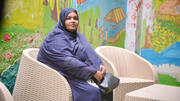-
Country Pages
-
Asia & the Pacific
- Afghanistan
- Bangladesh
- Bhutan
- Cambodia
- China
- India
- Indonesia
- Iran, Islamic Republic of
- Lao People's Democratic Republic
- Malaysia
- Maldives
- Mongolia
- Myanmar
- Nepal
- Pakistan
- Papua New Guinea
- Philippines
- Sri Lanka
- Thailand
- Timor-Leste
- Viet Nam
-
Eastern Europe & Central Asia
- Albania
- Armenia
- Azerbaijan
- Belarus
- Bosnia and Herzegovina
- Georgia
- Kazakhstan
- Kosovo Office
- Kyrgyzstan
- Moldova, Republic of
- North Macedonia
- Serbia
- Tajikistan
- Türkiye
- Turkmenistan
- Ukraine
- Uzbekistan
-
Arab States
- Algeria
- Djibouti
- Egypt
- Iraq
- Jordan
- Lebanon
- Libya
- Morocco
- Oman
- Palestine
- Somalia
- Sudan
- Syrian Arab Republic
- Tunisia
- Yemen
-
East & Southern Africa
- Angola
- Botswana
- Burundi
- Comoros
- Congo, the Democratic Republic of the
- Eritrea
- Eswatini
- Ethiopia
- Kenya
- Lesotho
- Madagascar
- Malawi
- Mauritius
- Mozambique
- Namibia
- Rwanda
- Seychelles
- South Africa
- South Sudan
- Tanzania, United Republic of
- Uganda
- Zambia
- Zimbabwe
-
Latin America & the Caribbean
- Argentina
- Bolivia, Plurinational State of
- Brazil
- Chile
- Colombia
- Costa Rica
- Cuba
- Dominican Republic
- Ecuador
- El Salvador
- Guatemala
- Haiti
- Honduras
- Mexico
- Nicaragua
- Panama
- Paraguay
- Peru
- Uruguay
- Venezuela, Bolivarian Republic of
- Caribbean (multi-country)
-
West & Central Africa
- Benin
- Burkina Faso
- Cabo Verde
- Cameroon
- Central African Republic
- Chad
- Congo
- Côte d'Ivoire
- Equatorial Guinea
- Gabon
- Gambia
- Ghana
- Guinea
- Guinea-Bissau
- Liberia
- Mali
- Mauritania
- Niger
- Nigeria
- Sao Tome and Principe
- Senegal
- Sierra Leone
- Togo
-

UNFPA Egypt
Through effective policies and programmes, Egypt has made important progress in ensuring widespread access to reproductive health services and reducing maternal deaths. Challenges remain, such as stagnating contraceptive prevalence, female genital mutilation/cutting, and maternal mortality rates. Since 1972, UNFPA has helped the national family planning and population programme overcome initial opposition and become a success. Today, UNFPA supports continued improvements, advocating for integrating reproductive care in primary health services, with full respect for reproductive rights. Programmes also focus on improving maternal health and reducing gender-based violence.
Population
- Population aged 0-14
- Population aged 15-64
- Population aged 65+
Sexual and reproductive health
- Births attended by skilled health personnel
Family Planning
- Modern method
Education
Gender, Rights, and Human Capital
Harmful Practices
Population Pyramid
Life Expectancy
Total fertility rate
News
In Egypt, men and boys stand firm against female genital mutilation
UPPER EGYPT, Egypt – “People tell me we inherited this practice – that they’re doing it because their neighbours are…
“Sanad is their lifeline”: Inside a UNFPA safe space in Egypt supporting women fleeing conflict in Sudan
CAIRO, Egypt – “There were dead bodies laying on the streets. I had to cover my six-year-old’s eyes so he didn’t see,”…


Social Updates
Tweets from UNFPATürkiye